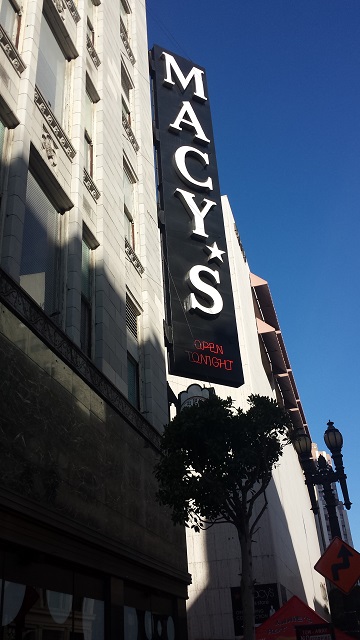Worries at unionized store about software, instead of people, telling employees when to come to work

By Chloe Johnson
FEBRUARY 23, 2015 — Macy’s in San Francisco is not just another store: like its counterpart in New York City, Macy’s Union Square has been a local institution for decades.
At Christmas time, the store puts puppies in the windows, and parents take their kids there to meet Santa Claus. Last week, the store was decorated for the Chinese New Year festivities.
Macy’s Union Square is also one of the few Macy’s stores in the nation whose sales staff is represented by a labor union, the United Food and Commercial Workers Local 5.
But there are changes afoot that are making Macy’s Union Square less like an old-fashioned department store and more like a big box store, at least for the employees.
While Macy’s workers speak with pride about their place of employment, they also say that there are unwelcome changes and bitter struggles between the union and management. Between August and November of last year, a new union contract was rejected three times by the members, before being narrowly approved, mainly to avoid a strike, according to shop steward Tony Vargas.
The crux of the conflict has been scheduling, possible loss of commissions, and whether Macy’s employees are considered skilled professionals or just interchangeable workers. The union had a victory when it voted down management’s proposal to do away with commission, and compromised on scheduling, narrowly approving a computerized scheduling system.
Help us save local journalism!
Every tax-deductible donation helps us grow to cover the issues that mean the most to our community. Become a 48 Hills Hero and support the only daily progressive news source in the Bay Area.
Macy’s is joining other retailers in using software, instead of human managers, to schedule employees. The computer programs are not designed to give workers regular schedules; in fact, they do the opposite. Macy’s workers in other stores say that increasingly sporadic and irregular schedules set by computers have made it hard to balance work with life, and some workers have even quit in frustration.
Unpredictable schedules in retail work have been a hot topic recently: they were the main problem that led to the passage of the Retail Workers’ Bill of Rights in San Francisco last November. There’s state legislation on the issue pending, too.
Macy’s Union Square plans to institute a computerized scheduling program in May, which, while still controversial, was considered to be not as bad as others by union members.
While the My Schedule Plus program has not started yet at Macy’s Union Square, Vargas knows several retail workers at other Macy’s branches and other retail brands who have complained about computerized scheduling.
“The online scheduling program ruins your life,” said Vargas. “It’s harder to build a clientele and a connection with customers.”
Julie Fisher, who has been a Macy’s employee for more than 30 years, said irregular schedules make it particularly hard for employees who have children, go to school, or need to keep medical appointments.
“Parents have to adjust their childcare, and there’s a snowball effect,” Fisher said. “Whether you have children or not, you deserve a predictable schedule. It’s retail: these are not emergency circumstances.”
Conny Ford, a vice president of the San Francisco labor council and longtime local activist, told us that scheduling software is typically designed by someone at corporate headquarters. It’s designed to measure hypothetical customer traffic based on complicated algorithms that translate to irregular schedules – that is, a worker is called in for three hours in the morning, sent home for a few hours in the middle of the day, and then called in for three more hours in the evening. It also changes week to week.
Another issue that came up in last year’s contract fight was the company’s plan to eliminate commission for salespeople, and instead pay flat hourly wages, said Mike Jones, a union representative with UFCW Local 5.
Jones said that the plan to get rid of commission, which 90 percent of all voting members of the union opposed, would have taken away the motivation for salespeople to improve their craft and move up in the company, and turn them into “just cashiers.” Although hourly workers would receive a raise based on their average commission sales over the past year, Jones believes that the company was pushing this “commission buyout” because it would save them thousands of dollars over the years.
“You would be locked into your rate,” Jones said. “You could go from Godiva chocolates and go to handbags, and it wouldn’t change. You would work a lot harder and make the same you made selling candy.”
Commissioned Macy’s salespeople make anywhere from $30,000 a year to $60,000, Jones said. Those making less tend to be younger workers, who are clustered in lower-level departments.
If the commission buyout had happened, as older workers retired and younger workers moved up from clothing sales to selling furniture or appliances, their hourly pay would remain the same. Therefore, the company would gradually shift to having lower-paid employees, according to Jones.
Macy’s company representative Megan Pardo told us that the company had no intention of paying workers less, only going to a different pay structure. She said the proposed changes would have kept Macy’s Union Square competitive and innovative.
“The prior contract was a six-year contract, and much change had happened in the retail industry over those years,” Pardo said.
Most long-time Macy’s employees don’t plan to go anywhere and will continue to fight to keep the quality jobs that attracted them to the company in the first place.
“I like working at Macy’s,” Fisher said. “There are things I’d like to improve, just like living in a neighborhood. You don’t just walk away.”




